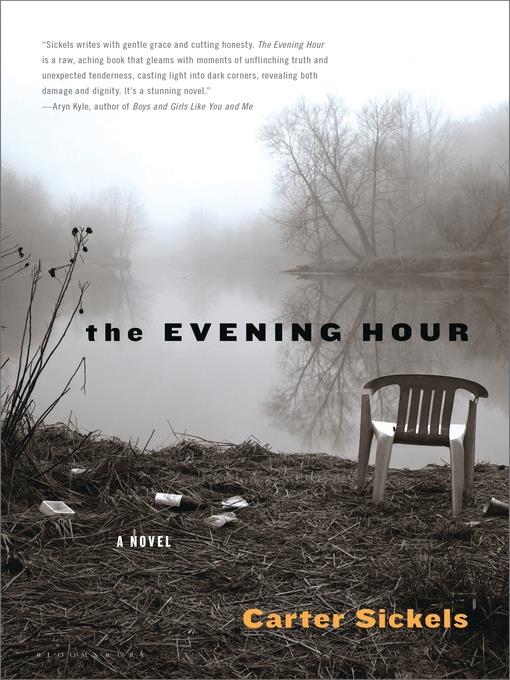
The Evening Hour
A Novel
کتاب های مرتبط
- اطلاعات
- نقد و بررسی
- دیدگاه کاربران
نقد و بررسی

October 10, 2011
Set in modern-day West Virginia coal country, Sickels’s debut revolves around a cast of characters whose world is pulled out from under them. Though protagonist Cole Freeman—a 27-year-old who works as an aide at a nursing home—likes the people he assists, he steals their belongings and deals the prescription drugs he buys from them. From his point of view, he’s not doing anything wrong, simply helping his patients who need money to pay their bills. Meanwhile, a coal mining company engaged in mountaintop removal poisons the landscape in an effort to force people off their land, posing a deadly threat to residents. However, families like Cole’s don’t want to move. In the words of Cole’s dying grandfather, a fire and brimstone preacher and snake handler: “Why would I want to live on land that my people never walked on?” Cole meanders through life, making on-again, off-again friendships, but he vows to change direction as the drug trade turns violent and he faces suspicion. The question becomes: is there a better life out there? Even at his worst, Cole proves well-intentioned and likable, with deep caring for others that proves refreshing, particularly when disaster strikes. Despite moments of heavy-handed foreshadowing and repetitive conversations, the novel is grounded in rich storytelling.

November 1, 2011
A plainspoken novel, but one with intensely lyrical moments, about the devastation of the West Virginia landscape--and the devastation to the local communities--owing to mountaintop removal. Cole Freeman is making it, but just barely. He works as an aide in a nursing home but supplements his meager income with the more lucrative trade of selling prescription drugs he either steals or buys off of the local elderly population. (In the small hollers of rural West Virginia, there's plenty of demand for escape.) Cole is to some extent a victim of his grandfather's Pentecostal religion, for this patriarch divides humanity into two types: the saved and the damned. Cole's mother, Ruby, was consigned to the latter category, as her father labeled her a slut for her unredeemable "whorish" ways. For 17 years she was absent from Cole's life but returns when Cole is 27. Cole has had an off-again/on-again relationship with the wild and tattooed Charlotte, but he's more interested in Lacy, a waitress at the Wigwam restaurant who lives an upright life and is morally committed to fight the depredations of the Heritage Coal Company, whose construction of a sludge dam threatens several of the communities along the creeks and streams. Cole's life is further complicated by the reappearance of Terry Rose, a childhood friend with whom he used to get drunk and stoned. Terry's idea of entrepreneurship is to cook meth, but this activity gets him both in trouble and in debt. Cole would like to change his life--to get out of the drug business, get a nursing degree and perhaps settle down with Lacy--but he feels tied down by circumstances that resist transformation. Sickels has great insight into the emotional life of West Virginians, and he refreshingly presents them as fully realized characters rather than as clichés or stereotypes.
(COPYRIGHT (2011) KIRKUS REVIEWS/NIELSEN BUSINESS MEDIA, INC. ALL RIGHTS RESERVED.)

November 1, 2011
In Dove Creek, WV, 27-year-old nursing home aide Cole Freeman cares for his elderly patients but helps himself to their valuables and prescription medications. His illicit earnings allow him to support the grandparents who raised him, a snake-handling pastor and a grandmother determined not to sell out to the mining company that looms above the hollows as it breaks down the mountains. The slew of junkie friends whom Cole supplies in the parking lot of the local bar and the visits he makes to those willing to sell their painkillers round out Cole's existence. The return of his long-absent mother and a high school friend complicates Cole's world even as he considers other options, like nursing school. Some heavy-handed foreshadowing clues us in to events to come that shake Cole's world. VERDICT Isolated and economically depressed, the Appalachia portrayed here is not new, but Cole's point of view is not one often encountered in contemporary fiction. First-time novelist Sickels paints Cole's experience with an unflinching hand. Give this to fans of regional literature and authors or display along with works by the likes of Sharyn McCrumb, Dorothy Allison, Barbara Kingsolver, Carolyn Chute, and Rick Bragg.--Jennifer B. Stidham, Houston Community Coll.-Northeast Lib., TX
Copyright 2011 Library Journal, LLC Used with permission.

December 15, 2011
In Sickels' sparkling debut, the inhabitants of Dove Creek, West Virginia, often speak of leaving but for complicated reasons can't or won't. Twenty-seven-year-old Cole Freeman tried leaving once but guiltily returned to help care for his aging grandfather, formerly a fiery Baptist minister, now an asocial prude. Because Cole was raised by his grandparents, he must respect their stubborn desire to remain in Dove Creek despite the coal company's offer to purchase their land, not to mention the recurrent earth-shattering explosions reminding them of the imminent dangers of coal-borne cancer. To support himself and his grandparents, Cole works as an aide in a nursing home, where he steals his patients' money and prescription pills to sell to others. As he dreams of eventually leaving town for good, his friends seem to be drifting away emotionally, leaving him feeling more isolated than ever before. Sickels' measured prose underscores the eeriness of a contradiction-riddled town plagued by boredom, sickness, and poverty in a powerful story of one man's effort to help others when no one is able to help him.(Reprinted with permission of Booklist, copyright 2011, American Library Association.)

























دیدگاه کاربران